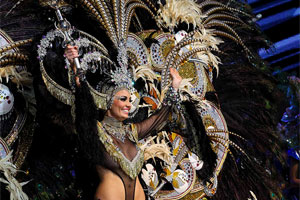Festivities in honour of the Virgen del Pilar and San Miguel Arcángel de Calanda

The Fiestas in honour of the Virgen del Pilar and San Miguel Arcángel are celebrated around the 12th and 13th of October and usually last four or five days.
The last Saturday of September or the first Saturday of October is the prelude to the Presentation of the Queens of the Fiestas and the Maintainer of the Fiestas, who is the person who gives the proclamation of the fiestas.
What are you going to experience during the fiestas of El Pilar de Calanda?
The most important events of the fiestas are the traditional ones: offering of flowers to the Virgen del Pilar, procession of the Virgin and Miguel Pellicer (both on the 12th), Rosary procession (13th) and offering of fruits to the Virgin (11th), apart from the traditional rosary of the Aurora on the 12th of October.
Non-religious events include (apart from the presentation of the Queens) the chupinazo on the first day of the fiestas, the parade of floats, the Festival de Jotas, the Ronda Jotera through the streets of the town, the fireworks, the popular meal on the last day of the fiestas and also the Bullfight on the Day of El Pilar, one of the most prestigious in the province.
All this is rounded off with open-air dances, an orchestra, a disco, a variety show, competitions, charanga tours and shows for children and the elderly.
Origin of the fiestas of Calanda
The origin of the Fiestas del Pilar de Calanda lies in the tradition of the Miracle of Calanda, by which the Virgen del Pilar replaced the amputated leg of the Calanda devotee Miguel Pellicer in 1640. In the past, in the days leading up to the fiestas of El Pilar, the commercial fair of San Miguel, co-patron saint of the town, was held.
Delicacies from Calanda: peaches, olive oil and more
The name of Calanda is linked to the peach, a product that is grown in its orchards and whose maximum exponent is the late variety (September-October), which is protected by a Denomination of Origin.

This product undergoes a long cultivation process, eliminating the excess when the fruit is green so that the remaining fruit is larger. To protect it, they are bagged one by one in paper bags on the tree, which gives them a uniform colour and avoids the excessive use of pesticides.
It is a sweet fruit, with tight flesh, considerable size and yellow skin. It is one of the most appreciated peaches on the market. They can be eaten fresh in season, but also canned, in syrup, with wine or dried (dried apricots).
Extra Virgin Olive Oil is also very important, as Calanda is part of the Designation of Origin of Aceite del Bajo Aragón. The main variety is the empeltre, which gives an oil with a golden colour, delicate aroma and fruity flavour.
Other olive derivatives are also typical, such as pâté and black olives from Aragon.
Finally, some farmers in Calanda produce the famous Ternasco de Aragón, lamb of the "rasa aragonesa" or ojinegra breed, which produces high quality meat.
Some typical dishes from Calanda are "perolicos de huerta", with summer vegetables from the Calanda market garden (to which snails are usually added), or "asadores", which consist of roasts of meat (it can be veal, chicken, rabbit, skewers... but also varied) with abundant vegetables and which used to be made in the local bread ovens.
Pastries are plentiful, both savoury, such as pepper and tuna or ham or potato and cod cakes; but also sweet, such as "tortas de alma" (angel hair cakes) or "brazo de gitano" (a pastry made in the local bakeries).




